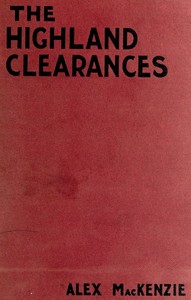The latest book which I’ve had posted on Project Gutenberg is The History of the Highland Clearances, by Alexander Mackenzie. This was published in 1914, revised from a first edition of 1883; besides Mr Mackenzie’s own accounts, there are pieces gathered from various authors. These include, somewhat bizarrely, one by Harriet Beacher Stowe in defence of the Sutherland clearances.
Some of the descriptions do more than verge on the sentimental:
Flora Robertson or Matheson, a widow, aged ninety-six years, then residing with her son, Alexander Matheson, who had a small lot of land in Suisinish. … “When the evicting officers and factor arrived, the poor old woman was sitting on a couch outside the house. The day being fine, her grandchildren lifted her out of her bed and brought her to the door. She was very frail; and it would have gladdened any heart to have seen how the two youngest of her grandchildren helped her along; how they seated her where there was most shelter; and then, how they brought her some clothing and clad her, and endeavoured to make her comfortable. The gratitude of the old woman was unbounded at these little acts of kindness and compassion; and the poor children, on the other hand, felt highly pleased at finding their services so well appreciated. The sun was shining beautifully, the air was refreshing, the gentle breeze wafted across the hills, and, mollified by passing over the waters of Loch Slapin, brought great relief and vigour to poor old Flora. Often with eyes directed towards heaven, and with uplifted hands, did she invoke the blessings of the God of Jacob on the young children who were ministering so faithfully to her bodily wants….
The indictment from the trial of one of the chief villains, Patrick Sellar, is rather more powerful in its dry repetition:
And further, you, the said Patrick Sellar, did, time aforesaid, culpably kill Donald M’Beath, father to Hugh M’Beath, then tenant in Rhimsdale aforesaid, by unroofing and pulling down, or causing to be unroofed and pulled down, the whole house in Rhimsdale aforesaid, where the said Donald M’Beath was then lying on his sick bed, saving only a small space of roof, to the extent of five or six yards, whereby the said Donald M’Beath was exposed, in a cold and comfortless situation, without cover or shelter, to the weather; and he, the said Donald M’Beath, in consequence of being so exposed, never spoke a word more, but languished and died about eight days thereafter, and was thereby culpably killed by you, the said Patrick Sellar: Or otherwise, you, the said Patrick Sellar, did, time and place aforesaid, cruelly expose the said Donald M’Beath to the weather, without cover or shelter, by pulling down and unroofing, or caused to be pulled down and unroofed, the greater part of the house where he then lay sick in bed, to his great distress, and the imminent danger of his life; and this you, the said Patrick Sellar, did, notwithstanding the entreaties of the said Hugh M’Beath, and others, you saying, in a rage, when it was proposed that the said Donald M’Beath should remain, “The devil a man of them, sick or well, shall be permitted to remain,” or words to that effect.
One aspect which is made clear is the length of time over which the clearances were carried out. The earliest reported here are from the late eighteenth century, the latest around 1880, while the bald “Statistical Statement” provides tables showing the decline of populations in most areas continuing down to 1911. Although there were protests against the clearances from the earliest days, they had essentially no effect on the actions of the landlords.


It’s quite sobering to realise that my grandfather David Ross, born 1839, and my grandmother Flora Davidson, born 1844, lived through the later stages of the clearances, although they were in Easter Ross which has a slightly different history.
The book does have a short chapter on “The Eviction of the Rosses” in the Tain area, which seems to have been characterised by particularly spirited women.
Glad to hear that!